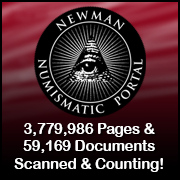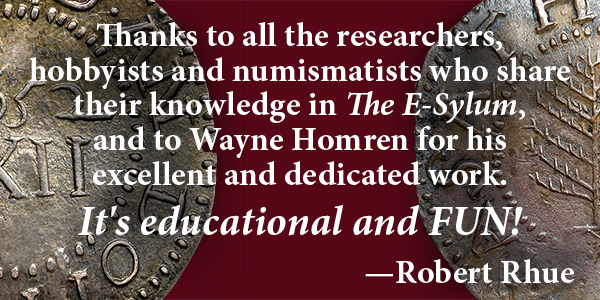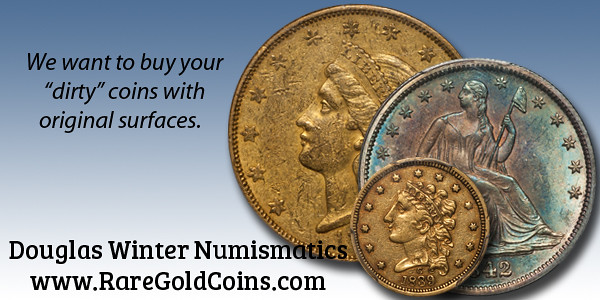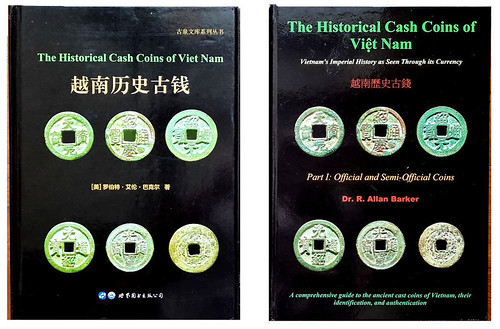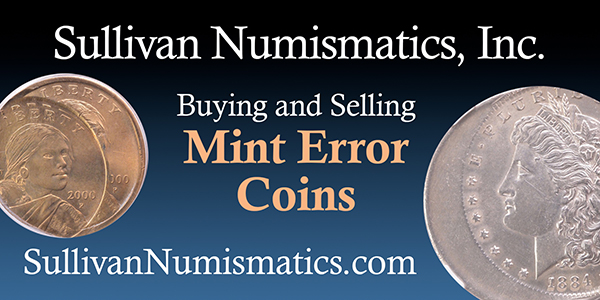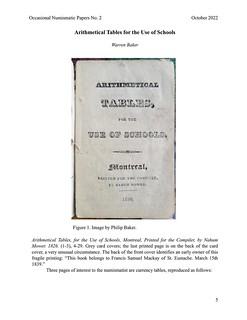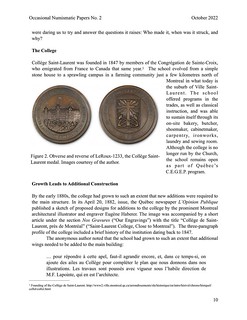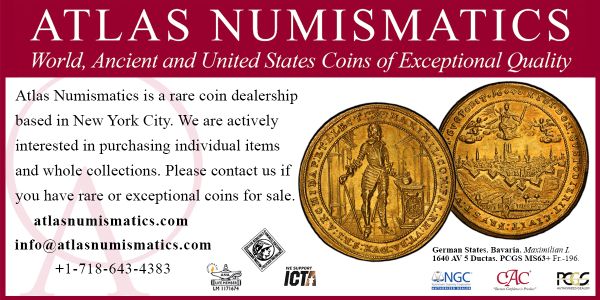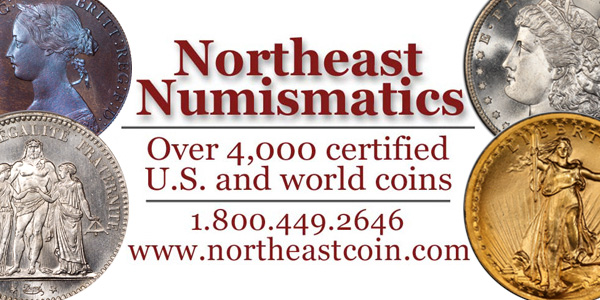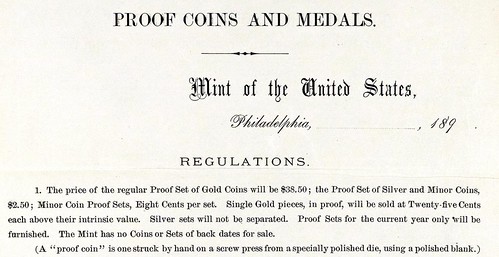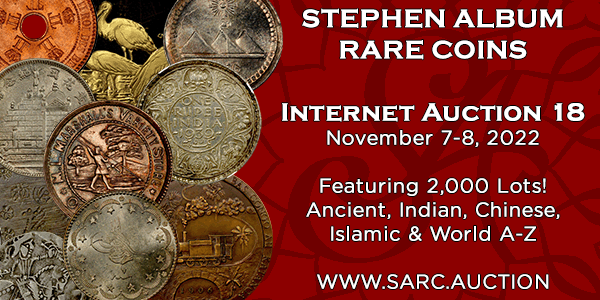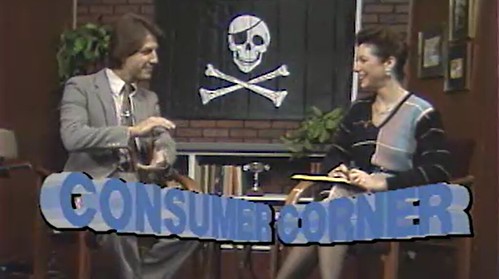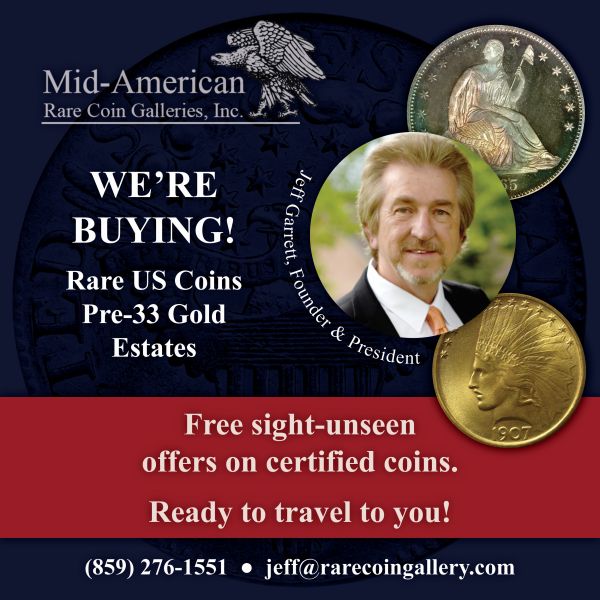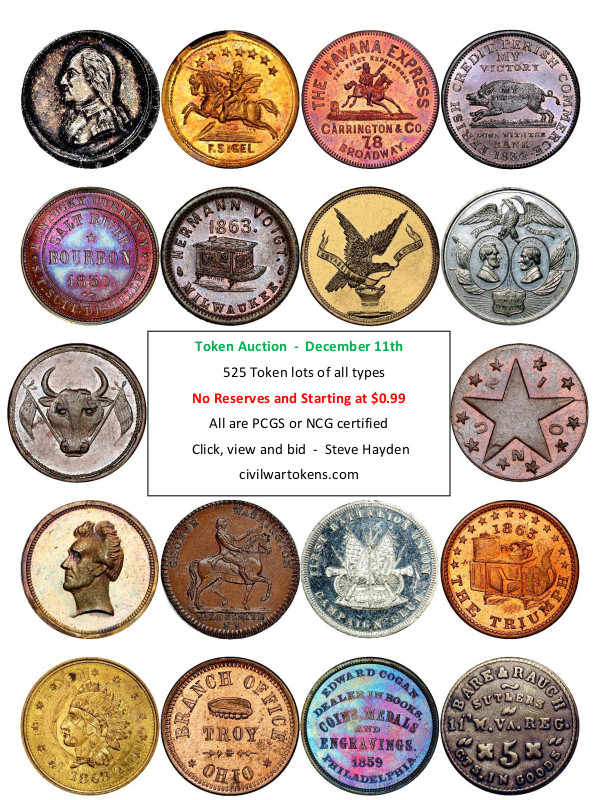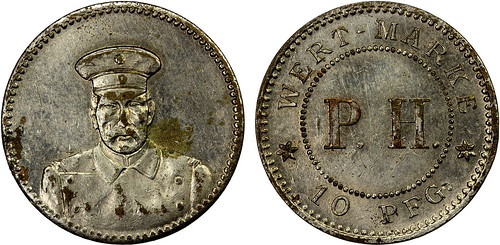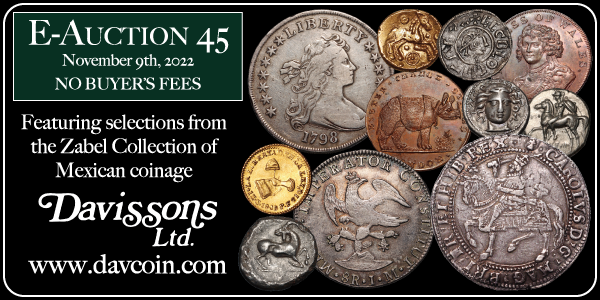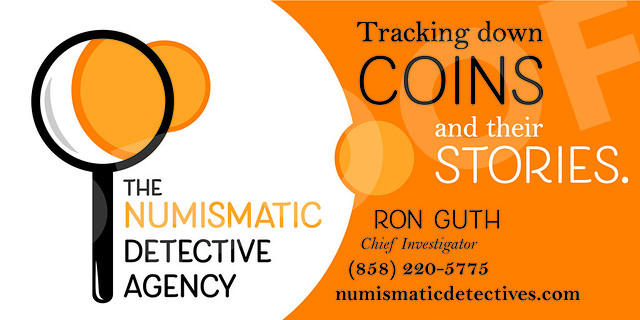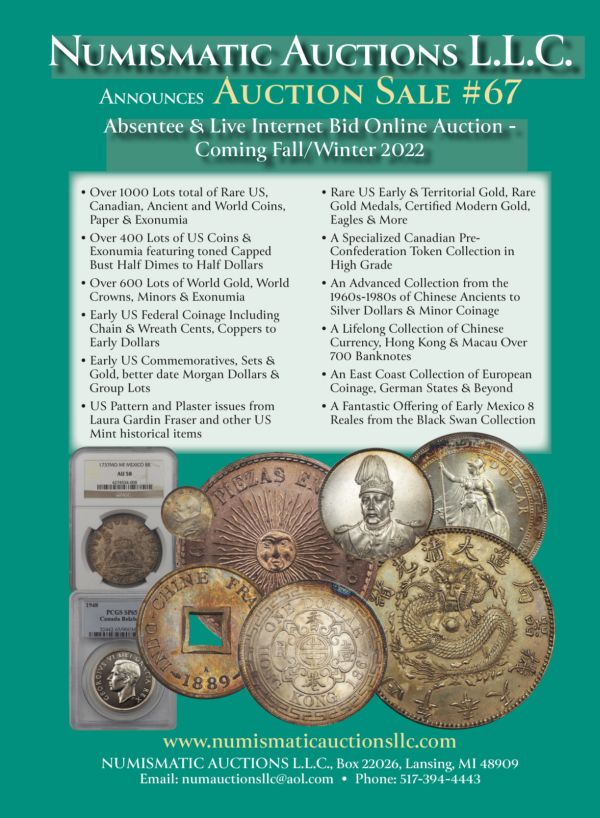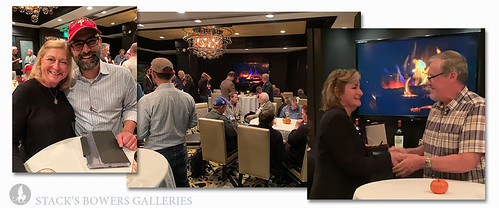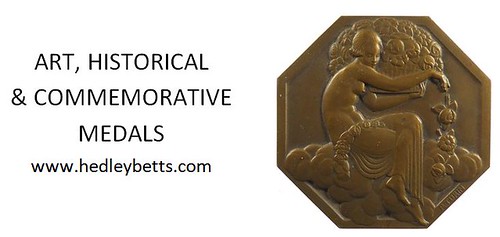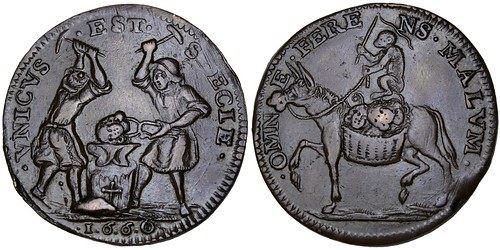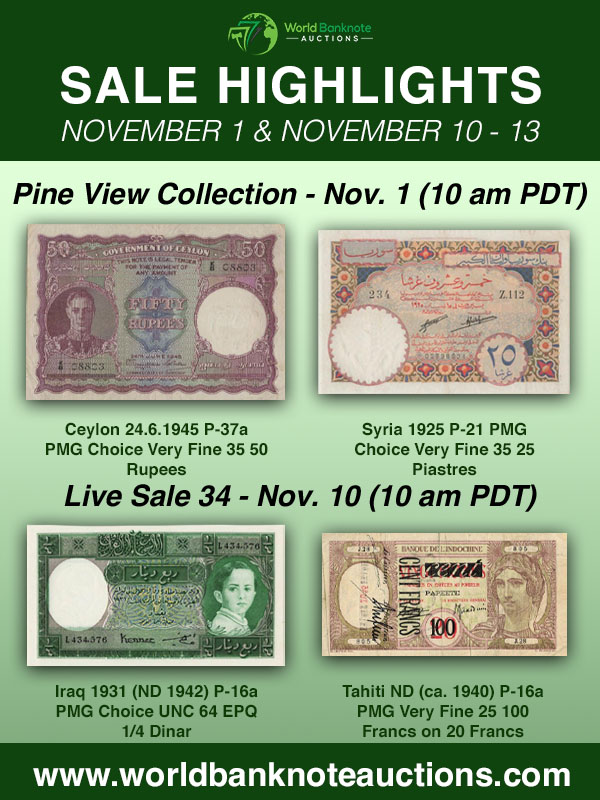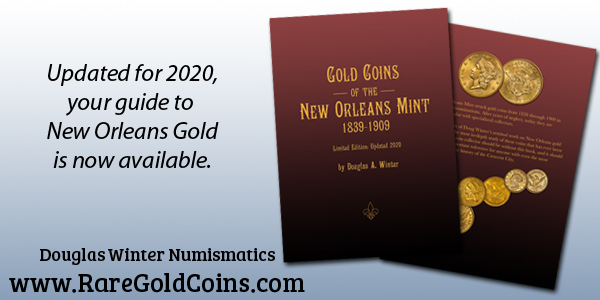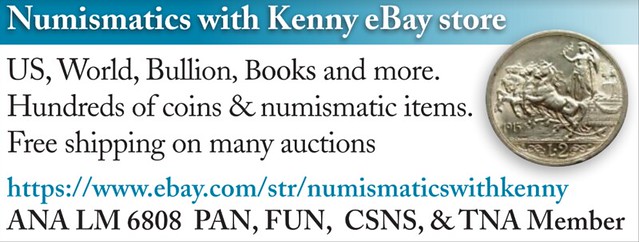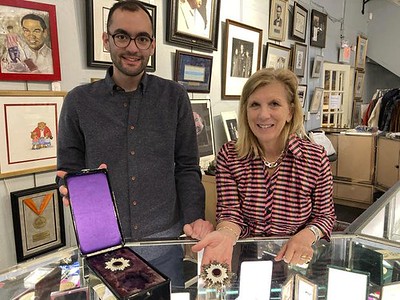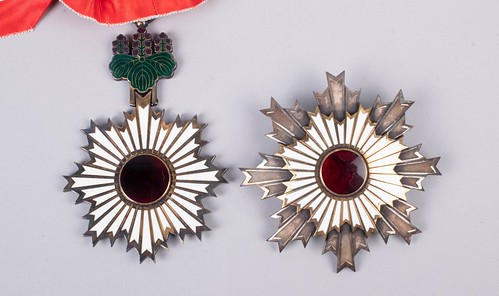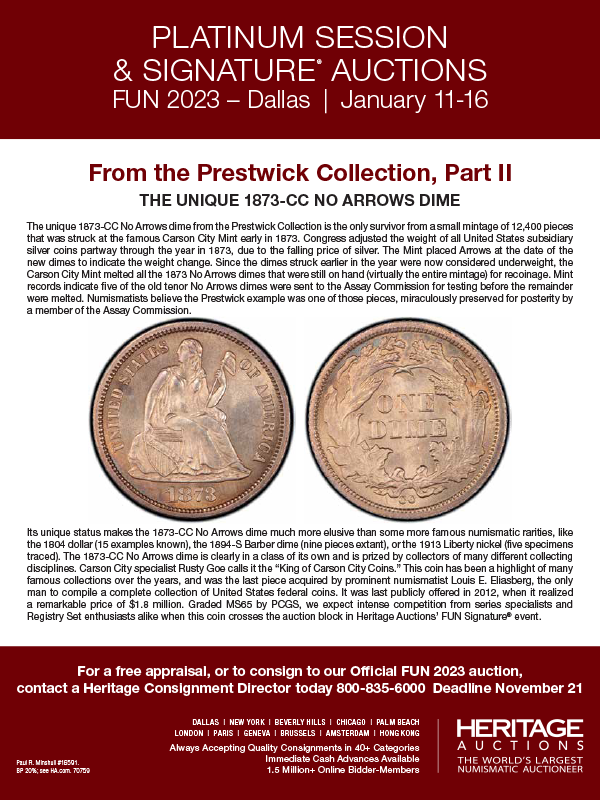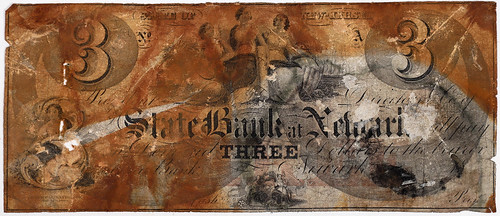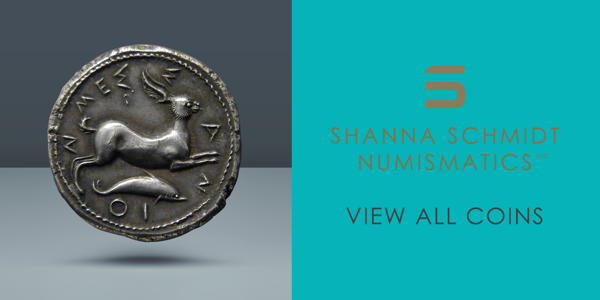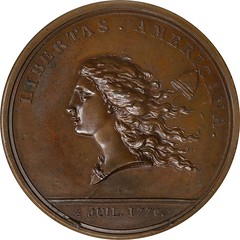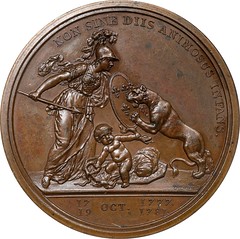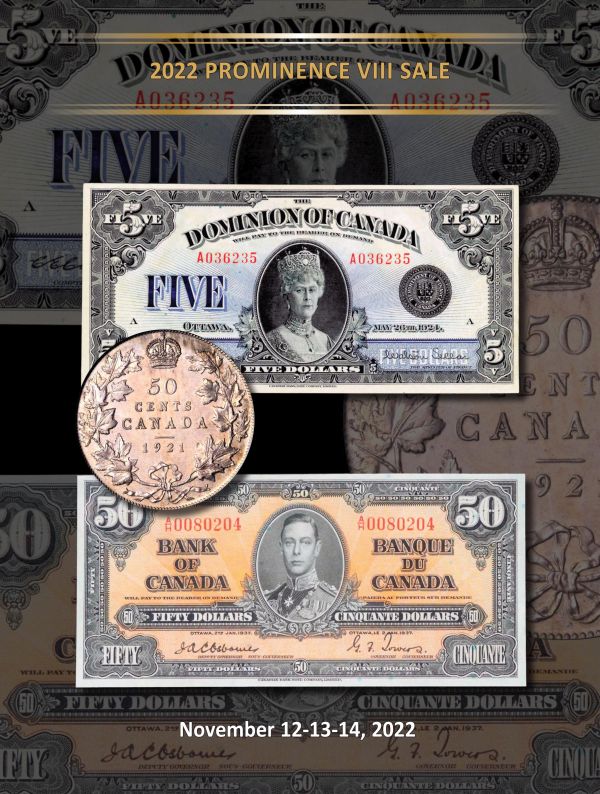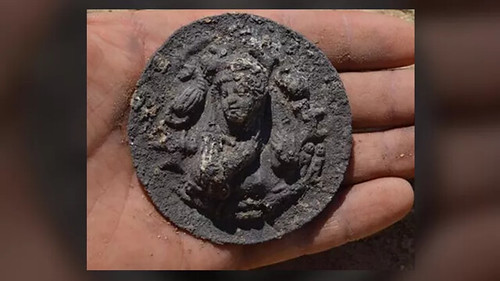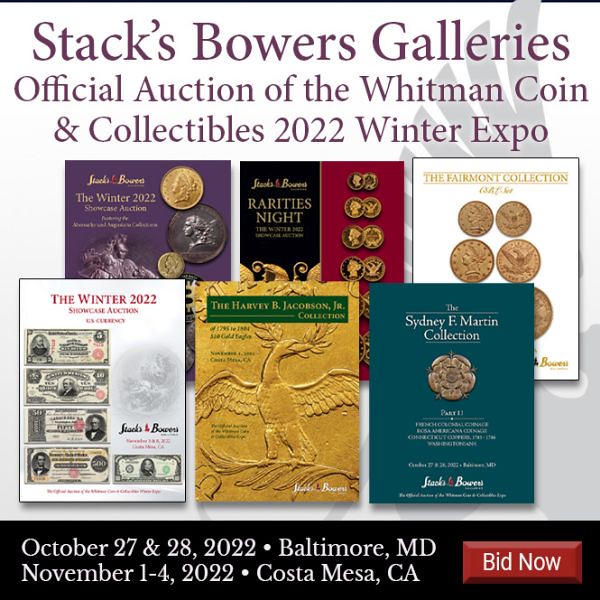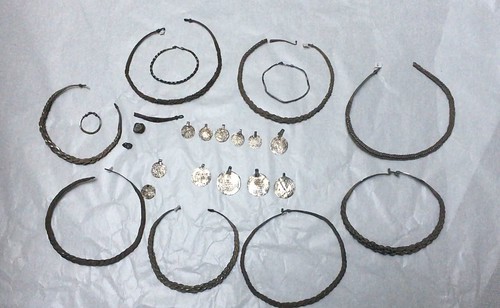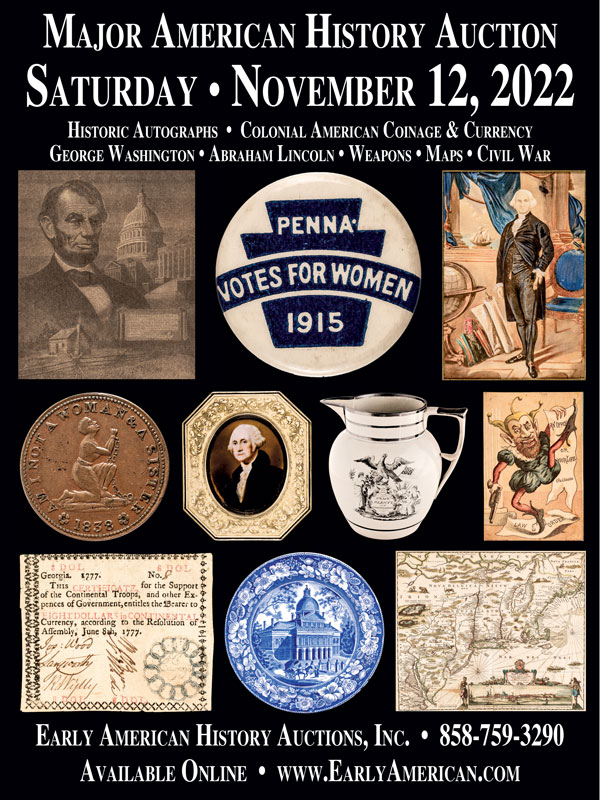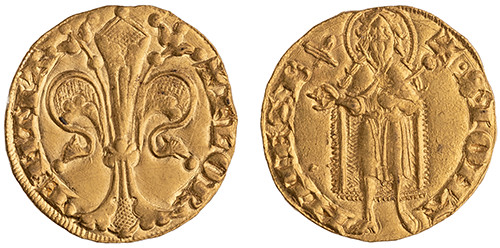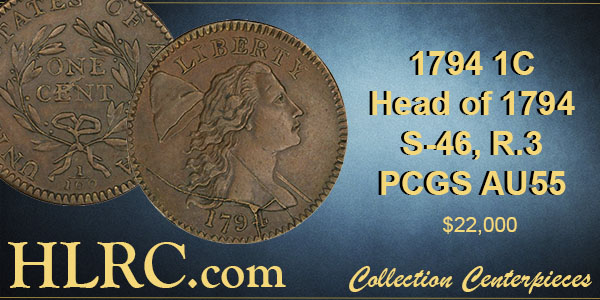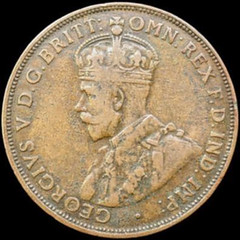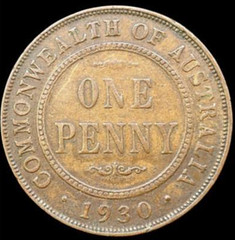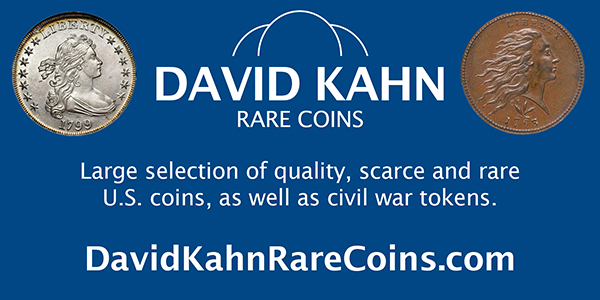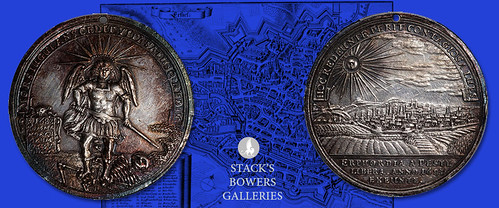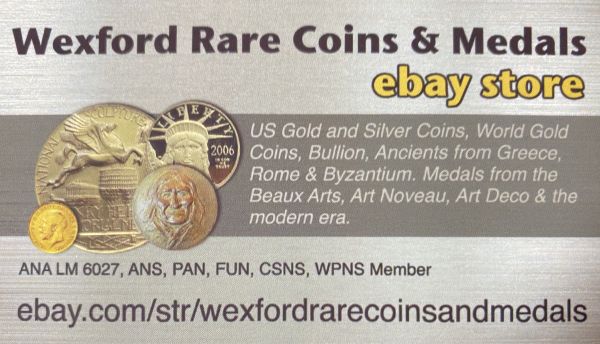
Visit our NBS Sponsors


About UsThe Numismatic Bibliomania Society is a non-profit association devoted to the study and enjoyment of numismatic literature. For more information please see our web site at coinbooks.org SubscriptionsThose wishing to become new E-Sylum subscribers (or wishing to Unsubscribe) can go to the following web page link MembershipThere is a membership application available on the web site Membership Application To join, print the application and return it with your check to the address printed on the application. Print/Digital membership is $40 to addresses in the U.S., and $60 elsewhere. A digital-only membership is available for $25. For those without web access, write to: Charles Heck, Treasurer AsylumFor Asylum mailing address changes and other membership questions, contact Chuck at this email address: treasurer@coinbooks.org SubmissionsTo submit items for publication in The E-Sylum, write to the Editor at this address: whomren@gmail.com BUY THE BOOK BEFORE THE COINSale CalendarWatch here for updates! |
- WAYNE'S WORDS: THE E-SYLUM NOVEMBER 6, 2022
- S.S. CENTRAL AMERICA ARTIFACT CATALOGS
- CHINESE EDITIONS ON ORIENTAL NUMISMATICS
- OCCASIONAL NUMISMATIC PAPERS NO. 2
- BOOK REVIEW: MORGAN SILVER DOLLARS, 7TH
- U.S. MINT FIXED PRICE LISTS ON NEWMAN PORTAL
- VIDEO: LISOT DIVES FOR ATOCHA TREASURE
- MONEY OF THE HOLOCAUST PRESENTATION
- REMINDER: NOVEMBER 2022 NNP SYMPOSIUM
- MORE ON THE "CAPTAIN OF KÖPENICK" TOKEN
- NOTES FROM E-SYLUM READERS: NOVEMBER 6, 2022
- ASTRONOMICAL HISTORY IN NUMISMATICS
- GUY FAWKES DAY NUMISMATICS
- VOCABULARY TERM: MECHANICAL DOUBLING
- DOUBLED DIES VS. MACHINE DOUBLING
- PURNIE MOORE (1907-2008)
- SYD MARTIN PART II AUCTION AND TRIBUTE EVENT
- NUMISMAGRAM SELECTIONS: NOVEMBER 2022
- DAVISSON'S E-AUCTION 45 ANCIENTS
- DAVISSON'S E-AUCTION 45 TOKENS
- COLIN POWELL MEDALS, MEMENTOS UP FOR SALE
- SELECTED GENERAL COLIN POWELL MEDALS
- S.S. CENTRAL AMERICA BANKNOTES OFFERED
- NUMISMATIC NUGGETS: NOVEMBER 6, 2022
- THE AMAZING ATHENIAN TETRADRACHM
- APHRODITE ZODIAC MEDALLION FOUND IN RUSSIA
- SWEDISH CACHE OF VIKING SILVER FOUND
- HOW MUCH IS THAT IN DOLLARS?
- 1930 AUSTRALIAN PENNIES COME TO MARKET
- COMMEMORATIVE MEDAL ON THE BLACK DEATH
- CANADIAN WAR MUSEUM ADDS VICTORIA CROSS
- LOOSE CHANGE: NOVEMBER 6, 2022
Click here to read the thin version on the web
Click here to subscribe
Click here to access the complete archive
To comment or submit articles, reply to whomren@gmail.com
Content presented in The E-Sylum is not necessarily researched or independently fact-checked, and views expressed do not necessarily represent those of the Numismatic Bibliomania Society.
WAYNE'S WORDS: THE E-SYLUM NOVEMBER 6, 2022
 New subscribers this week include:
Mark Chamberlin, courtesy John and Nancy Wilson;
Chris Jones, courtesy Mike McNeil; and
Charles Derby.
Welcome aboard!
New subscribers this week include:
Mark Chamberlin, courtesy John and Nancy Wilson;
Chris Jones, courtesy Mike McNeil; and
Charles Derby.
Welcome aboard!
Thank you for reading The E-Sylum. If you enjoy it, please send me the email addresses of friends you think may enjoy it as well and I'll send them a subscription. Contact me at whomren@gmail.com anytime regarding your subscription, or questions, comments or suggestions about our content.
This week we open with two new catalogs, two new books, Occasional Numismatic Papers number two, and updates from the Newman Numismatic Portal too.
Other topics this week include U.S. Mint fixed price lists, money of the Holocaust, astronomy and Guy Fawkes in numismatics, machine doubling, Purnie Moore, Syd Martin, Gen. Colin Powell, Athenian tetradrachms, a Zodiac medallion, and Viking silver.
To learn more about Oriental numismatics, Morgan Silver Dollars, the Atocha treasure, remnants of the Newman Collection, Harry Houdini, 1864-L Indian Head Cents, chronograms, cabinets of the Vertuosi, Conjugal Duties coppers, British trade tokens, the Order of the Rising Sun, banknotes from the S.S. Central America, the 1964-D Dollar, Build-A-Bear for money nerds, and coins dropped from the top of the Empire State Building, read on. Have a great week, everyone!
Wayne Homren
Editor, The E-Sylum
S.S. CENTRAL AMERICA ARTIFACT CATALOGS
Holabird Western Americana Collections LLC is offering catalogs for their upcoming sales of artifacts recovered from the wreck of the S.S. Central America. See another article elsewhere in this issue for information on the sale, which includes obsolete banknotes recovered from the ship's safe. -Editor
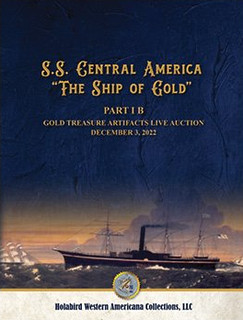 S.S. Central America Artifacts December Auction Catalogs - 2 Piece Set
S.S. Central America Artifacts December Auction Catalogs - 2 Piece Set
$100.00
Our most anticipated auction of the year will be held on Saturday, December 3, 2022, and will be presented in 2 catalogs.
Catalog A features shipwreck artifacts retrieved exclusively from the S.S. Central America The Ship of Gold,
and is presented in a collectors edition spiral bound format inclusive of 3D Glasses and 3D underwater imagery of the spectacular treasure artifacts as they were discovered on the ocean floor.
Catalog B contains complimentary Gold Rush era artifacts including gold, gold pokes, Gold Rush related documents and more.
CHINESE EDITIONS ON ORIENTAL NUMISMATICS
Scott Semans reports that two important English-language works on Oriental numismatics are being offered in Chinese editions. Great news - thanks. -Editor
From correspondence with the authors I have learned that two important English-language books on Oriental numismatics will be published in Chinese editions.
Ch'ing Cash (2016) by Dr. Werner Burger is being translated and, according to the author's widow, will be printed in the same format and quality as the original. This oversized slipcased work contains a detailed, illustrated history of Qing minting in one volume, and extensive by-year charts for the cash coinage in a second volume. Even with an $800 list price, the edition is nearly sold out and the list price has been raised to $960. The Chinese edition is expected in 2023.
OCCASIONAL NUMISMATIC PAPERS NO. 2
Christopher Faulkner and Jacob Lipson recently launched a new online publication on Canadian numismatics called Occasional Numismatic Papers. Issue No. 2 is now available. -Editor
Contents of Occasional Numismatic Papers No. 2
I. Letters to the Editors (page 3)
II. Arithmetical Tables for the Use of Schools by Warren Baker (page 5)
BOOK REVIEW: MORGAN SILVER DOLLARS, 7TH
Dennis Tucker of Whitman Publishing passed along this review by Jeff Garrett of the upcoming new edition of the Morgan dollar Guide Book. -Editor
Morgan Silver Dollars is Essential Reading
The seventh edition of Whitman Publishing's best-selling Guide Book of Morgan Silver Dollars, by Q. David Bowers, will debut this December, available from booksellers and hobby shops nationwide. Here, Jeff Garrett, the Senior Editor of the Red Book, reviews the new volume and shares some thoughts on these popular coins.
U.S. MINT FIXED PRICE LISTS ON NEWMAN PORTAL
Newman Numismatic Portal Project Coordinator Len Augsburger provided this report on U.S. Mint Fixed Price Lists. Thanks. -Editor
VIDEO: LISOT DIVES FOR ATOCHA TREASURE
The David Lisot Video Library on the Newman Numismatic Portal can be found at:
https://nnp.wustl.edu/library/multimediadetail/522852
We highlight one of his videos each week in The E-Sylum. Here's one from 1985 where David talks about his adventure diving for treasure coins. -Editor
MONEY OF THE HOLOCAUST PRESENTATION
The Eric P. Newman Numismatic Education Society (EPNNES) sponsors more than just the Newman Numismatic Portal. In today's MPC Gram Steve and Ray Feller recounted their experience presenting a talk on money of the Holocaust at Washington University in St. Louis. With permission, we're republishing their report here. -Editor
Money of the Holocaust: A presentation by Steve and Ray Feller
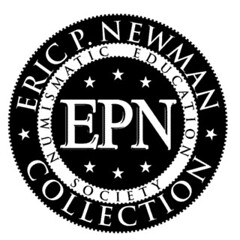 Sponsored by the Newman Educational Foundation and Olin Library Special Collections Division, Washington University
Sponsored by the Newman Educational Foundation and Olin Library Special Collections Division, Washington University
Per the announcement to invitees: This presentation will explore forms of money used in World War II concentration and internment camps, and will reveal how money was used to control prison populations, as well as its use as a tool of propaganda.
The Fellers were introduced by Leonard Augsburger, Project Coordinator for the Newman Numismatic Portal (NNP) project. Addressing an audience of both numismatists and non-numismatists, Ray and Steve held the attention of all for over an hour with a combination of history and stories of the people behind the money. Chits, notes, and a few coins from all theaters of the war were shown in a flying tour of WWII camp numismatics.
REMINDER: NOVEMBER 2022 NNP SYMPOSIUM
And don't forget the upcoming NNP Symposium taking place November 17-19, 2022. See the links below for more information on topics and presenters. -Editor
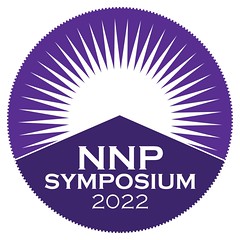 The NNP Symposium is a free, online event that brings together a variety of numismatic speakers and covers a wide array of numismatic subjects. Featuring approximately 25 presentations, attendees will easily find topics of interest. This is the fifth such event, which was launched in fall 2020 in response to the pandemic.
The NNP Symposium is a free, online event that brings together a variety of numismatic speakers and covers a wide array of numismatic subjects. Featuring approximately 25 presentations, attendees will easily find topics of interest. This is the fifth such event, which was launched in fall 2020 in response to the pandemic.
In the area of U.S. coins, our feature presentation will cover U.S. material in the cabinet of the American Numismatic Society (ANS). The ANS holdings in this area are both substantial and surprising. The financier J.P. Morgan made sizable donations to the ANS collection in the beginning of the 20th century, and over time many others have additionally contributed to this important New York repository. Jesse Kraft, the ANS Resolute Americana Assistant Curator of American Numismatics, will be on hand to answer audience questions following this presentation.
MORE ON THE "CAPTAIN OF KÖPENICK" TOKEN
Henk Groenendijk shared these thoughts on the "Captain of Köpenick" token mentioned last week. Thanks. -Editor
It was surprised to see a token (Stephen Album Rare Coins Lot 1340) I have in my collection presented in last week's E-Sylum. But I was really astonished by its attribution to the German Schutzgebiet
of Kiau Chau. As far as I know the token is from Berlin, Germany. It is described as number 418 in the book Berlin Marken und Zeichen
by W. Hasselman (1987).
NOTES FROM E-SYLUM READERS: NOVEMBER 6, 2022
Outstanding Club Publication Award
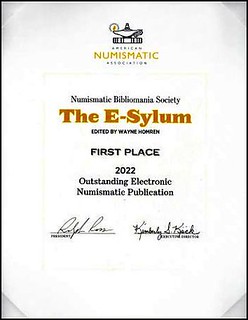 An The E-Sylum subscriber writes:
An The E-Sylum subscriber writes:
"Today I received the November 14, 2022, issue of Coin World. I see on page 10 that The E-Sylum received first place in the Barbara J. Gregory Outstanding Club Publications competition. Boy that Numismatic Bibliomania Society must be a great club to produce such a publication. My congratulations go out to you and to all your fine contributors who submit articles each week."
NBS is indeed a great club and our contributors are the best. We couldn't do it without their dedicated participation. Thanks, everyone! -Editor
To read the earlier E-Sylum article, see:
ASYLUM AUTUMN 2022 ISSUE PUBLISHED
(https://www.coinbooks.org/v25/esylum_v25n37a02.html)
Other topics this week include the Halloween-themed Houdini Medal, and 1864-L Indian cents. -Editor
ASTRONOMICAL HISTORY IN NUMISMATICS
Mike Marotta writes:
"I had a placement about collecting numismatic and philatelic topic themes in Issue #100 of the History of Astronomy semi-annual newsletter. See pages 20-24.
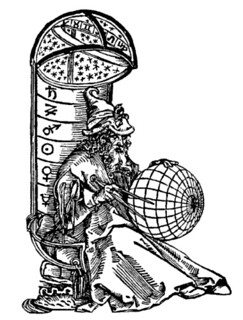 "Since February 2020, I have been a volunteer editor with the History of Astronomy Division of the American Astronomical Society. I am responsible for a column, "This Month in Astronomical History." The articles publish first in AAS News and then are placed on the HAD webpage here:
"Since February 2020, I have been a volunteer editor with the History of Astronomy Division of the American Astronomical Society. I am responsible for a column, "This Month in Astronomical History." The articles publish first in AAS News and then are placed on the HAD webpage here:
https://had.aas.org/resources/astro-history
"In addition to catching other people's subject-verb disagreements and comma splices, I am always looking for writers who want to place about 750 words on a timely celebration of astronomical history in a peer-reviewed publication.
"The AAS is focused on researchers, primary investigators who run programs and hire post-doctoral students and others not as far along in their careers. If you have a doctorate in astronomy and only teach at university, you can be an Educational Affiliate, just as I am an Amateur Affiliate member. That said, though, the AAS is reaching out to a wider audience in the wake of their purchase and rescue of Sky & Telescope magazine, following the demise of F+W Media. They also bought (and saved from extinction) Willmann-Bell, publishers of books targeted to the broad range of hobbyists up to the professional level."
THE BOOK BAZARRE
GUY FAWKES DAY NUMISMATICS
Well-read numismatists can fairly easily dream up a numismatic connection to just about anything. Yesterday was Guy Fawkes Day in England. Quick - name a numismatic connection. Stumped? Here's some background - a nice summary from The Writer's Almanac. -Editor
Today is the British holiday known as Guy Fawkes Day. Fawkes was born in 1570; he was a tall, well-built man with thick reddish hair and a quick mind. A school friend described him as pleasant of approach and cheerful of manner, opposed to quarrels and strife … loyal to his friends.
Though he had been born and baptized a Protestant, he converted to Catholicism as a teenager, when his widowed mother remarried a Catholic man named Dionis Baynbrigge. When he was 21, he sold his father's estate and went off to Europe to fight with Catholic Spain against Dutch Protestants. While he was in Flanders, he was recruited by a member of what would become known as the Gunpowder Plot: a plan devised by English Catholics to blow up the Houses of Parliament and assassinate King James I, who was a Protestant. The group's leader, Robert Catesby, had heard of Fawkes' military prowess, particularly his expertise with explosives.
VOCABULARY TERM: MECHANICAL DOUBLING
Here's another entry from Dick Johnson's Encyclopedia of Coin and Medal Terminology. -Editor
Mechanical Doubling. Tiny lines or offset around the edge of lettering because of loose dies in the coining press. Also called double line by collectors, it shows a shift to one side forming a double outline of letters or numbers near the rim. The phenomenon is not in the die – it is not a doubled die – but is a chattering of a loose die during striking, particularly after a long press run. It has been described as a twisting of the die as it withdraws pulling small metal relief from its fixed position leaving large heavy relief, as a portrait or device, unaffected. It is cleared up by tightening the set bolts in the chucks holding the die in place. Such errors are usually not collected by numismatists because of their minor interest in the field.
DOUBLED DIES VS. MACHINE DOUBLING
Here's an excerpt from a nicely illustrated 2017 article on the NGC website titled "Doubled Dies vs. Machine Doubling". -Editor
The distinction between genuine die doubling and mechanical doubling can be subtle, but they can easily be differentiated with just a loupe and a bit of knowledge.
One of the more common questions that NGC Customer Service receives is regarding the difference between a doubled die and machine doubling. This distinction is very important, because a doubled die variety may be worth a large premium, while machine doubling is a mere novelty and does not usually add value.
PURNIE MOORE (1907-2008)
American Numismatic Biographies author Pete Smith submitted this article on Alabama numismatist Purnie Moore. Thanks! -Editor
The topic of hundred-year-old numismatists comes up occasionally in The E-Sylum. Apparently, I have become the keeper of the list. I recently added another name that had previously been overlooked.
SYD MARTIN PART II AUCTION AND TRIBUTE EVENT
A Stack's Bowers blog article describes a nice event held at the recent Whitman Baltimore Expo in honor of the late Syd Martin. -Editor
During the Whitman Coin & Collectibles Winter Expo last week we hosted two auction sessions showcasing selections from the Sydney F. Martin Collection. It was said that the series featured in these sessions ranked high on the list of Syd's numismatic passions, as did his fellow enthusiasts in the Colonial Coin Collectors Club (C4). Thus, last week's auction venue for Part II of Syd's collection gave us the perfect opportunity to honor our friend and colleague.
The sale itself saw spirited bidding which resulted in numerous price records. The unique 1670-A French Colonies copper double de l'Amerique, the earliest dated coin bearing the word America,
realized an astounding $504,000 – the highest price ever paid for a French Colonial coin. The expansive Rosa Americana offering generated considerable excitement, highlighted by the 1717 Pre-Patent twopence that realized $28,800 – a record for a Pre-Patent Rosa Americana coin – and the famous 1733 twopence Pattern PCGS PR-62 BN that sold for $57,600. The eagerly anticipated 1785 and 1786 Connecticut coppers set many new high-water marks for that series, such as $43,200 for the unique 1785 Miller 6.6-A.3 die variety. Other notable prices realized included those for high-end type coins such as the 1786 Miller 5.3-N Hercules Head PCGS AU-55 at $22,200 and the 1786 Miller 6-K Draped Bust Left PCGS AU-55 at $26,400.
NUMISMAGRAM SELECTIONS: NOVEMBER 2022
Jeremy Bostwick at Numismagram forwarded along these four highlights from his recent November addition of new material to his website. In addition to the items below, there are some attractively toned German medals, some Hungarian medical-themed medals, and a small-sized Betts medal in silver relating to the Treaty of Hubertusburg and end of the French & Indian War. For all of the new items, please visit https://www.numismagram.com/inventory. -Editor
DAVISSON'S E-AUCTION 45 ANCIENTS
Davissons Ltd shared these selections from the firm's upcoming E-Auction 45. -Editor
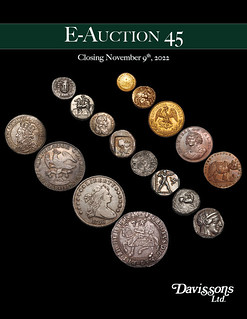 Our Greek offering is highlighted by several carefully selected consignments. Look for fine silver and bronze from Sicily, Macedon, Thrace, Thessaly, Lycia, and more. Of particular note is the first offering from a collection of classic Larissa facing head issues, and several choice single and small group lots from the Robert Hoge collection.
Our Greek offering is highlighted by several carefully selected consignments. Look for fine silver and bronze from Sicily, Macedon, Thrace, Thessaly, Lycia, and more. Of particular note is the first offering from a collection of classic Larissa facing head issues, and several choice single and small group lots from the Robert Hoge collection.
Our Roman selection opens on several fine Provincial issues, particularly of Augustus and Hadrian. The Republican offering consists of denarii from the Zabel collection, and the Imperial section includes several nice early bronzes of Augustus and Titus, and choice late silver including a rare legionary issue of Gallienus.
DAVISSON'S E-AUCTION 45 TOKENS
Allan Davisson also penned an article about some of the great British trade tokens in Davisson's E-Auction 45. -Editor
British trade tokens are the story of the need for small change in daily life when the government was unable or unwilling to provide an official
currency. Tokens for daily trade became a part of British life in England and Wales soon after the death of Charles I. Not much later, Irish tokens became a part of commerce there as well. (The Scots avoided the problem by allowing an extensive issue of base metal coins.)
The governments of the era simply did not issue small change. Until 1696 there was the additional problem of hammered silver lacking full value because of all the clipping of pieces in circulation. Political instability was a major reason. The Civil War disrupted life. The reigns of the sons of Charles I—Charles II and James II—dealt with the turmoil after Commonwealth rule fell apart after the death of Cromwell. Then the Glorious Revolution
when William of Orange, ruler of the Dutch Republic, came to England with his wife Mary, the daughter of James II, and took over the British throne eventually brought some minting stability, and the great recoinage of 1696 brought a substantial issue of silver.
COLIN POWELL MEDALS, MEMENTOS UP FOR SALE
The sale of the estate of General Colin Powell includes many medals awarded to him over his long career. -Editor
Colin Powell's career spanned some of the most significant moments of the last 40 years so it's no surprise that an auction of items from his estate reflects that: gifts and medals from foreign dignitaries and presidents, photos of his swearing-in as secretary of state.
THE BOOK BAZARRE
SELECTED GENERAL COLIN POWELL MEDALS
Here are some of the medal lots included in the sale of General Powell's estate. -Editor
Lot 1099: ORDER OF THE RISING SUN MEDAL AND PIN, GRAND CORDON 1ST CLASS, AWARDED TO GENERAL POWELL BY THE JAPANESE GOVERNMENT, 1991
the medal in silver with gold highlights, with white enamel, depicting a rising sun; the medal on the red and white ribbon with purple berries in enamel, with small pin; in black lacquer box with Japanese inscription, the interior in purple silk and velvet (3)
Catalogue note:
Established in 1875 by Emperor Meiji, the Order of the Rising Sun recognizes individuals who have accomplished distinguished achievements in international relations, the promotion of Japanese culture, and the preservation of the environment.
S.S. CENTRAL AMERICA BANKNOTES OFFERED
Here's the press release for Part I of the S.S. Central America sales coming up in December. More amazing material! -Editor
boxes will be offered for the first time in December 3, 2022 auction
NUMISMATIC NUGGETS: NOVEMBER 6, 2022
Here's a selection of interesting or unusual items I came across in the marketplace this week. Tell us what you think of some of these. -Editor
"1781" (1783) Libertas Americana Medal. Original. Paris Mint. By Augustin Dupre. Adams-Bentley 15, Betts-615. Bronze. MS-63 BN (NGC).
Great example of the classic of all classic U.S. medals. From the Stack's Bowers November 2022 Collectors Choice Online Auction. -Editor
To read the complete lot description, see:
"1781" (1783) Libertas Americana Medal. Original. Paris Mint. By Augustin Dupre. Adams-Bentley 15, Betts-615. Bronze. MS-63 BN (NGC).
(https://auctions.stacksbowers.com/
lots/view/3-ZXU68/1781-1783-libertas-americana-medal-original-paris-mint-by-
augustin-dupre-adams-bentley-15-betts-615-bronze-ms-63-bn-ngc)
Other topics this week include the Trafalgar Naval General Service Medal, the 1907 Brenner Lincoln Plaque, and Dan Carr's 1964-D Morgan Dollar. -Editor
THE AMAZING ATHENIAN TETRADRACHM
Michael Bugeja published an nice overview article on the Athenian tetradrachm on World Coin News. I appreciated the discussion of test cuts. Here's an excerpt - see the complete article online. -Editor
The Athenian owl is considered one of the greatest coins, not only because of its beauty, but because of its elegant design — head of Athena on the obverse, iconic owl image on the reverse, and identifying inscription — making it the prototype for centuries of coins worldwide.
There are several types of Athenian owls, with the first appearing circa 510 BCE. The owl graced Athenian coinage for centuries. The earlier designs, though highly collectible, are a far cry from the classical artistic standard beginning in 465 BCE and flourishing between 440-404 BCE.
APHRODITE ZODIAC MEDALLION FOUND IN RUSSIA
An interesting early Zodiac medallion has been uncovered in Russia. -Editor
Russian archaeologists have unearthed an intricately detailed silver medallion of the Greek goddess Aphrodite in the 2,100-year-old grave of a young woman, possibly a priestess, on the northeastern coast of the Black Sea.
The medallion also shows 10 — not the known 12 — signs of the zodiac, and gives unique insight into religious practices at that time and place.
SWEDISH CACHE OF VIKING SILVER FOUND
Leon Saryan and Arthur Shippee passed along this article about a find of Viking silver in Sweden. Thanks. -Editor
A hoard of Viking silver, described as a once-in-a-lifetime discovery by onsite archeologists, has been unearthed in Täby, a municipality north of Stockholm.
HOW MUCH IS THAT IN DOLLARS?
An American Numismatic Society Pocket Change blog article by David Yoon explores the age-old (and difficult!) question of how much a past coin was worth in terms of present-day money. Here's an excerpt - see the complete article online. -Editor
Something we are asked from time to time is how much a past coin was worth in terms of present-day money. It can be hard enough sometimes to say what the coin was worth at the time it was in circulation. Equating it to present-day money brings in some additional difficulties.
Let's consider one of the most important trade coins of the late Middle Ages, the Florentine gold florin. This was famously recognized as a stable standard of value in western Europe for centuries. Many works in economic history use the Florentine florin as a standard for comparing values between late medieval currencies.
1930 AUSTRALIAN PENNIES COME TO MARKET
Don Cleveland passed along this impromptu Australian treasure hunt story with a happy ending for six participants. Thanks! Great story. -Editor
Six lucky Australians have found rare 1930s pennies potentially worth a small fortune after searching through their drawers.
It comes after one rare penny sold for a record-breaking $60,000 at auction last month.
Since then, a handful of Australians have searched their homes for their own rare pennies.
COMMEMORATIVE MEDAL ON THE BLACK DEATH
Jeremy Bostwick published a short article this week on the Stack's Bowers blog about a medal related to the Black Death. Creepy cool! -Editor
As very recent history should show, any emergence from the specter of mass disease is always most welcome and worthy of commemoration. This sense of optimism and yearning for life as it was before
is recounted through numerous works of medallic art from the early modern period. One such instance is a rather rare and interesting silver medal in our upcoming November Collectors Choice Online (CCO) auction. Issued in 1683 for the city of Erfurt in Germany, this specimen—likely holed for wearing as a charm—features a scene that would be quite appropriate for this past week's Halloween festivities, with the Archangel Michael standing facing in full armor. With a radiant nimbus crown encircling his head, he places his sword back in its scabbard, as he had finally slain the wickedness of the disease that had so ravaged the city.
CANADIAN WAR MUSEUM ADDS VICTORIA CROSS
The Canadian War Museum has acquired a Victoria Cross. -Editor
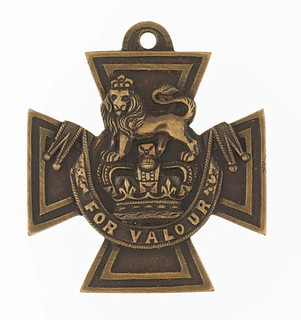 Tommy Holmes' Victoria Cross is now in the Canadian War Museum's care.
Tommy Holmes' Victoria Cross is now in the Canadian War Museum's care.
Holmes is one of three Victoria Cross winners celebrated in Owen Sound, along with Billy Bishop and David Currie. At 19 years, Holmes was one of the youngest Canadians to be awarded the Commonwealth's highest military honour for bravery.
The War Museum already displays the VCs of Bishop, the First World War flying ace, and Currie, the Second World War tank battle group commander. There are no immediate plans to display Holmes' medal, confirmed Eric Fernberg, a collections specialist at the War Museum.
LOOSE CHANGE: NOVEMBER 6, 2022
Here are some additional items in the media this week that may be of interest. -Editor
Get It.
Steve Roach and Dennis Tucker write a column for the Official ANA Blog. Here's an excerpt from the October 2022 installment - see the complete article online. -Editor
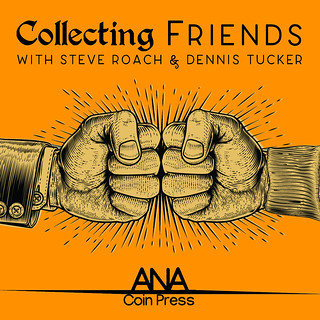 One of the great things about our hobby community is the friendship that develops over time. When you're with other collectors, you speak the same language, you know the same stories, you have the same background—even if you were born miles apart, generations apart, or in different cultures.
One of the great things about our hobby community is the friendship that develops over time. When you're with other collectors, you speak the same language, you know the same stories, you have the same background—even if you were born miles apart, generations apart, or in different cultures.
When you go to a coin show, or attend a club meeting for the first time, it's easy to make new friends. Just ask the question, What do you collect?
Boom! An instant ice-breaker that immediately launches an interesting conversation, and an easy way to get to know somebody!
If your new friend has been collecting longer than you, you have an opportunity to absorb knowledge. If you've been collecting longer, it's a chance to share and teach. But you'll both be learning.
On the other side of the coin are non-collector friends and family who just don't get it.
Hard as it is to imagine, some people are immune to the bite of the collecting bug. I remember when I was about fourteen and a friend's father, who learned about my hobby, asked with a laugh, What do you do after school, go home and polish your coin collection?
The nerve! Never mind that you should never clean a coin with polish. Of course I didn't clean them—I constructed little boxes filled with cotton to store and study them, like any reasonable coin-collecting kid would!
To read the complete article, see:
COLLECTING FRIENDS: WHEN FRIENDS AND FAMILY ATTACK!
(https://blog.money.org/coin-collecting/friends-and-family)
Other topics this week include a Victoria Cross Medal and dropping a penny from the Empire State Building. -Editor

